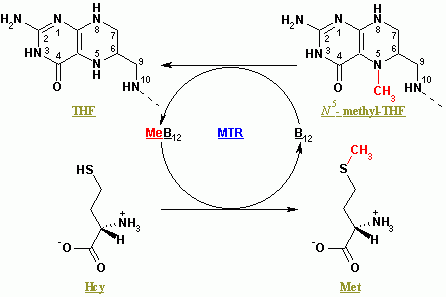Methionine synthase
| N 5 -methyl tetrahydrofolate homocysteine S -methyl transferase | ||
|---|---|---|

|
||
| Properties of human protein | ||
| Mass / length primary structure | 1227 amino acids | |
| Identifier | ||
| Gene name | MTR | |
| External IDs | ||
| Enzyme classification | ||
| EC, category | 2.1.1.13 , transferase | |
| Substrate | 5-methyltetrahydrofolate, L- homocysteine | |
| Products | Tetrahydrofolic acid, L- methionine | |
| Occurrence | ||
| Homology family | HOG000251409 | |
| Parent taxon | Creature | |
The methionine synthase (Gen: MTR , also known as homocysteine methyltransferase known) catalyzes the final step in the regeneration of methionine (Met) of homocysteine (Hcy) using the cofactor methylcobalamin or vitamin B12.
Methionine is an essential amino acid that is not synthesized de novo by the human body . It is the starting substance for S- adenosyl methionine , which is an important source of active methyl groups.
A malfunction of the methionine synthase also appears to be the cause of neural tube defects .
function
literature
- YN Li, S. Gulati, PJ Baker, LC Brody, R. Banerjee, WD Kruger: Cloning, mapping and RNA analysis of the human methionine synthase gene. In: Hum Mol Genet . 5 (12), December 1996, 1851-1858. doi: 10.1093 / hmg / December 5, 1851 . PMID 8968735 .
- RV Banerjee, RG Matthews: Cobalamin-dependent methionine synthase. In: FASEB J . 4 (5), March 1990, pp. 1450-1459. PMID 2407589 .
- TM Zydowsky: Stereochemical analysis of the methyl transfer catalyzed by cobalamin-dependent methionine synthase from Escherichia coli B. In: Journal of the American Chemical Society . 108 (11), 1986, pp. 3152-3153. doi: 10.1021 / ja00271a081 .
- Z. Zhang, C. Tian, S. Zhou, W. Wang, Y. Guo, J. Xia, Z. Liu, B. Wang, X. Wang, BT Golding, RJ Griff, Y. Du, J. Liu: Mechanism-based design, synthesis and biological studies of N5-substituted tetrahydrofolate analogs as inhibitors of cobalamin-dependent methionine synthase and potential anticancer agents. In: European Journal of Medicinal Chemistry . 58, 2012, pp. 228-236. doi: 10.1016 / j.ejmech.2012.09.027 . PMID 23124219 .
- RG Matthews, AE Smith, ZS Zhou, RE Taurog, V. Bandarian, JC Evans, M. Ludwig: Cobalamin-Dependent and Cobalamin-Independent Methionine Synthases: Are There Two Solutions to the Same Chemical Problem? In: Helvetica Chimica Acta . 86 (12), 2003, p. 3939. doi: 10.1002 / hlca.200390329 .
- KR Wolthers, NS Scrutton: Protein Interactions in the Human Methionine Synthase − Methionine Synthase Reductase Complex and Implications for the Mechanism of Enzyme Reactivation. In: Biochemistry . 46 (23), 2007, pp. 6696-6709. doi: 10.1021 / bi700339v . PMID 17477549 .
- R. Pejchal, ML Ludwig: Cobalamin-Independent Methionine Synthase (MetE): A Face-to-Face Double Barrel That Evolved by Gene Duplication. In: PLoS Biology . 3 (2), 2005, p. E31. doi: 10.1371 / journal.pbio.0030031 . PMC 539065 (free full text). PMID 15630480 .
- JC Evans, DP Huddler, MT Hilgers, G. Romanchuk, RG Matthews, ML Ludwig: Inaugural Article: Structures of the N-terminal modules imply large domain motions during catalysis by methionine synthase. In: Proceedings of the National Academy of Sciences 101 (11), 2004, pp. 3729-3736. doi: 10.1073 / pnas.0308082100 . PMC 374312 (free full text). PMID 14752199 .
- H. Hesse, R. Hoefgen: Molecular aspects of methionine biosynthesis. In: Trends in Plant Science. 8 (6), 2003, pp. 259-262. doi: 10.1016 / S1360-1385 (03) 00107-9 . PMID 12818659 .
- O. Outteryck, J. De Sèze, T. Stojkovic, J. -M. Cuisset, D. Dobbelaere, S. Delalande, A. Lacour, M. Cabaret, A.-C. Lepoutre, V. Deramecourt, H. Zéphir, B. Fowler, P. Vermersch: Methionine synthase deficiency: A rare cause of adult-onset leukoencephalopathy. In: Neurology . 79 (4), 2012, pp. 386-388. doi: 10.1212 / WNL.0b013e318260451b . PMID 22786600 .
Individual evidence
- ↑ Holger Hesse, Rainer Hoefgen: Molecular aspects of methionine biosynthesis . In: Trends in Plant Science . tape 8 , no. 6 , June 2003, p. 259 , doi : 10.1016 / S1360-1385 (03) 00107-9 (English).
- ↑ Entry on neural tube defects. In: Römpp Online . Georg Thieme Verlag, accessed on March 3, 2015.
